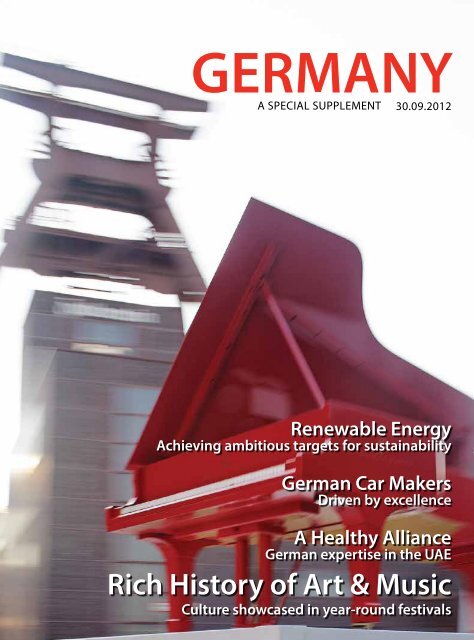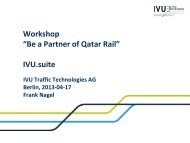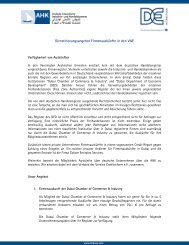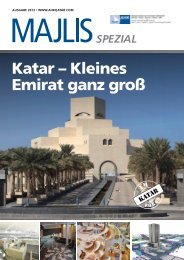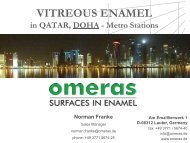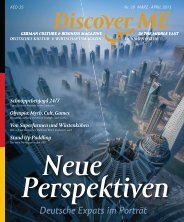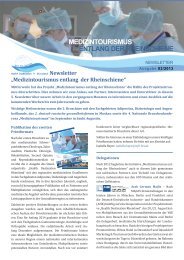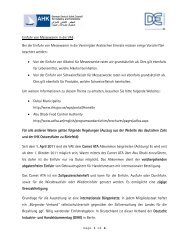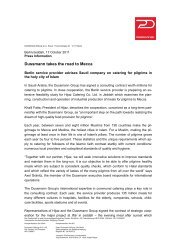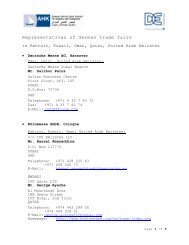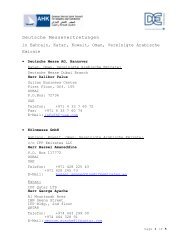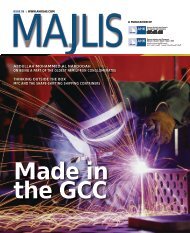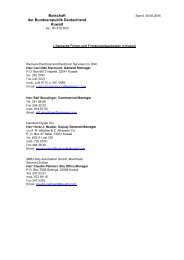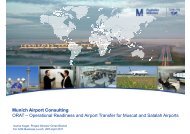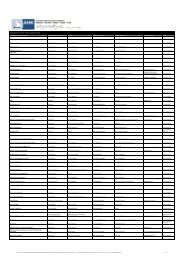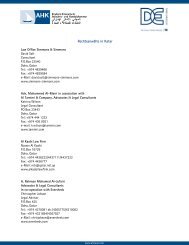germany - AHK - AHKs
germany - AHK - AHKs
germany - AHK - AHKs
You also want an ePaper? Increase the reach of your titles
YUMPU automatically turns print PDFs into web optimized ePapers that Google loves.
GERMANY<br />
A SPECIAL SUPPLEMENT 30.09.2012<br />
Renewable Energy<br />
Achieving ambitious targets for sustainability<br />
German Car Makers<br />
Driven by excellence<br />
A Healthy Alliance<br />
German expertise in the UAE<br />
Rich History of Art & Music<br />
Culture showcased in year-round festivals
CONTENTS<br />
4 Banking the German way<br />
Financial industry capitalises on regional potential<br />
10 Renewable Energy<br />
Germany achieves ambitious targets in the quest for<br />
sustainability<br />
16 10 Reasons the German Car Industry<br />
Stays on Top<br />
Car makers prove their mettle<br />
24 A Healthy Alliance<br />
How German expertise is helping to shape healthcare<br />
in the UAE<br />
35 Artistic Traditions<br />
Berlin has more than 400 galleries, spectacular museums and a<br />
thriving arts culture<br />
38 Classical Influence<br />
Wagnerites and Brahmsians alike benefit from<br />
Germany’s rich musical history<br />
Produced By Media Republic FZC<br />
In collaboration with the commercial department of:<br />
40 Reel Success<br />
German cinema competes on the world stage<br />
42 Frankfurt’s Vibrant Landscape<br />
Rustic village charm meets cosmopolitan style<br />
44 Quality Stands the Test of Time<br />
German brands cover the world from head to toe<br />
DISCLAIMER:<br />
The publishers regret that they cannot accept liability for errors or omissions<br />
contained in this publication, however caused.<br />
COVER IMAGE: Essen- Grand piano in front of the Zollverein coal<br />
mine industrial complex. Photodesigner : Mark Wohlrab. Image<br />
Courtesy : Deutsche Zentrale für Tourismus e.V.<br />
GERMANY SUPPLEMENT | 03
BANKING<br />
Banking the<br />
German way<br />
The German banking industry in the UAE grew dramatically in size and scope<br />
before the financial crisis. Today, these resillient firms share how and where they<br />
continue to find opportunities in the Middle East. - By Sara Hamdan<br />
From the glossy halls of the Dubai International<br />
Financial Centre to dedicated space in free zones,<br />
the German banking industry has gradually<br />
increased its regional scope over the past five<br />
years. As trade relations between Europe and<br />
the Middle East and North Africa grew, most of<br />
Germany’s banking powerhouses began opening<br />
branches in the region.<br />
This accelerated during the boom years of 2006<br />
and 2007, with most of the prominent banks<br />
turning to Dubai as a hub to service the rest of the<br />
Arab world.<br />
Analysts say that European banks, and German ones<br />
in particular, have strong growth potential in the<br />
region. Although the Middle East markets are small,<br />
fragmented, and still in the process of developing a<br />
complete financial infrastructure, foreign<br />
The Middle East has been<br />
developing significantly over<br />
the past few years and is now a<br />
key market for the international<br />
banking industry.<br />
- Micheal Cohrs, Head of Global<br />
Banking, Deutsche Bank<br />
institutions were intrigued by lucrative opportunities<br />
in frontier markets characterised by young<br />
populations, oil revenues and strong fundamentals.<br />
German banks that were among the first to open<br />
local branches, including Commerzbank and<br />
Deutsche Bank, showed that it was possible to<br />
provide the right services for local clients and<br />
navigate through financial difficulty during the<br />
crisis of 2008.<br />
Deutsche Bank, which has had an office in Dubai<br />
since 2001, opened another branch in the DIFC in<br />
2006 in order to take advantage of the growing<br />
opportunities in the region. The bank soon became<br />
a founding member of the DIFX, the free zone’s<br />
stock exchange, and was the first to list products<br />
when it launched in September 2005.<br />
“The Middle East has been developing significantly<br />
over the past few years and is now a key market for<br />
the international banking industry,” said Micheal<br />
Cohrs, head of global banking at Deutsche Bank.<br />
“This is an initial step in the bank’s growth plans.”<br />
Commerzbank, Germany’s second largest bank,<br />
opened its DIFC branch a year later in 2007.<br />
Commerzbank provides banking services for<br />
institutional investors in the Middle East, as well as<br />
asset management services through Cominvest, a<br />
wholly owned subsidiary.<br />
Aside from offering conventional banking services,<br />
Commerzbank also became the region’s first<br />
specialist in international banking for real estate.<br />
This catered uniquely to the local markets, as<br />
real estate investing has had a strong tradition,<br />
particularly in the Gulf region.<br />
“The addition of Commerzbank to the DIFC’s<br />
growing number of eminent financial institutions<br />
will help strengthen ties between this region<br />
and the markets of Europe,” said Nasser Al Shaali,<br />
the DIFC Authority’s chief executive at the time<br />
the bank opened. “Commerzbank is a respected<br />
and influential force in global banking, and its<br />
presence in the Middle East will significantly<br />
invigorate the sector here.”<br />
As these two institutions made headway in new<br />
territory, the German banking industry began to<br />
grow in size as other banks decided to expand their<br />
presence in the region. In 2008, Landesbank Baden-<br />
Württemberg, shipping giant HVB, and private<br />
bank Dresden Bank were among the prominent<br />
German banks to open branches in the UAE.<br />
Most of these institutions used Dubai and the<br />
DIFC as a hub from which to service the rest of the<br />
region. For Landesbank, the focus of the business<br />
was to provide consulting and financial services<br />
to German medium-sized businesses entering the<br />
regional markets, from Libya all the way to the<br />
Arabian Gulf. Iran and Pakistan are also serviced by<br />
the firm’s office in the DIFC.<br />
Investors are demanding an<br />
increasing exposure to MENA<br />
investments, but historically they<br />
have had little access to these<br />
opportunities.<br />
- Nazem Al Kudsi, CEO, ADIC<br />
04 | GERMANY SUPPLEMENT GERMANY SUPPLEMENT | 05<br />
“<br />
“<br />
“<br />
“
Other German banks set up outside the DIFC,<br />
which was the case for BHF Bank, Germany’s<br />
second largest private bank. Rather than just<br />
setting up a branch office, BHF launched a<br />
partnership with Abu Dhabi Investment Company,<br />
focusing on its asset management business and<br />
providing advisory services.<br />
“Investors are demanding an increasing exposure<br />
to MENA investments, but historically they have had<br />
little access to these opportunities,” said Nazem Al<br />
Kudsi, chief executive of ADIC, in a statement. “BHF<br />
Bank has recognised this gap.”<br />
During the UAE’s boom days, German banks<br />
began setting up in the region, one after the<br />
other, reaching a peak in 2008. In May 2008, the<br />
200-million-euro German Business Park, based<br />
in Silicon Oasis, opened its doors to German<br />
companies. Designed as a hub for German firms<br />
in the UAE and the Gulf region, the project was a<br />
joint venture between the Bin Jabr Group, holding a<br />
majority share of 68 per cent, and the Dubai Silicon<br />
Oasis Authority, which owns a 32 per cent stake.<br />
Offering an array of services under one roof, the<br />
park, which is home to the German Centre Dubai,<br />
provides office space and business services to<br />
German companies, including banks. The unique<br />
project is meant to serve as another bridge for<br />
German companies and investors interested in<br />
the UAE.<br />
When the financial crisis hit in the fall of 2008,<br />
however, these entities were tested in their ability<br />
to weather downturns in the economy. Most were<br />
forced to downsize and run lean operations during<br />
the ensuing difficult times. They were ready when<br />
good deals began to flow once more, which was the<br />
case for Deutsche Bank in April of this year, when<br />
it arranged the first international sukuk for Saudi<br />
Electricity Company, the largest utility firm in the<br />
Middle East alongside HSBC, worth $1.75 billion.<br />
“The issuance also represents the largest<br />
international capital markets transaction by<br />
a Saudi corporation,” said Jamal Al Kishi, chief<br />
executive officer of Deutsche Securities Arabia, a<br />
subsidiary of Deutsche Bank Group. “We are proud<br />
to have contributed to its financing success, which<br />
we hope will support the Kingdom’s growth at this<br />
important juncture.”<br />
Similarly, in July 2012, Commerzbank Dubai<br />
executed the first trade in a repo loan market in<br />
the UAE. Clearstream, a financial institution, joined<br />
hands with Abu Dhabi Commercial Bank to provide<br />
triparty repo services. This is a significant step in the<br />
evolution of a Middle Eastern triparty repo market<br />
and the general sophistication of Middle East<br />
financial market infrastructure.<br />
The German banking industry has also given back to<br />
the community with corporate social responsibility<br />
initiatives. In April 2012, Deutsche Bank was<br />
awarded the Patron of the Arts award by Sheikh<br />
Mohammed bin Rashid Al Maktoum for the bank’s<br />
contributions to the local art scene in 2011. Last<br />
year, the bank sponsored a plethora of art projects,<br />
including an open air display of 25 balancing<br />
sculptures dotted across the DIFC and Emirates<br />
Palace in Abu Dhabi.<br />
As the German banking industry continues to<br />
grow and capitalise on regional potential, new<br />
avenues continue to be explored – ranging from<br />
the introduction of new funds to creative corporate<br />
social responsibility programs.<br />
GERMANY SUPPLEMENT | 07
RENIEWABLE ENERGY<br />
Renewable Energy<br />
Germany leads in the race towards a future driven by renewable energy.<br />
With a global focus on reducing dependency on<br />
fossil fuels for the world’s energy needs, many<br />
countries are actively seeking to develop renewable<br />
energy sources and none more so than Germany,<br />
described by renewableenergyworld.com as the<br />
world’s first major renewable energy economy. But<br />
the country’s efforts in the field are not confined to<br />
its own borders; German technology and expertise<br />
is contributing to renewable energy success stories<br />
all around the world, including here in the UAE.<br />
One of the first countries to introduce legislation<br />
regarding renewable energy, Germany created and<br />
implemented the Renewable Energy Sources Act in<br />
2000 to provide a framework within which German<br />
energy providers could work together to decrease<br />
reliance on fossil fuels and progress towards the<br />
country’s aim of becoming entirely dependent<br />
10 | GERMANY SUPPLEMENT<br />
upon renewable energy. Ambitious targets were<br />
set, including a goal of 60 per cent reliance upon<br />
renewable energy by 2050, and excellent progress<br />
is being made.<br />
Current statistics published by BDEW - the German<br />
Association of Energy and Water Industries -<br />
indicate some 25 per cent of electricity generated<br />
in Germany in the first six months of 2012 was<br />
from a renewable source. Wind power tops the list<br />
followed by biomass, or material acquired from<br />
living organisms, hydro-electrics and solar energy.<br />
Production of photovoltaic energy is on the rise,<br />
leaping 47 per cent from 3.6 per cent in 2011 to 5.3<br />
per cent in the first half of 2012, as progress is made<br />
towards decreasing its relatively high production<br />
cost in comparison to other renewable<br />
energy sources.<br />
Alongside these efforts to develop reliance on<br />
renewable energy within Germany, the country has<br />
been instrumental in promoting environmentally<br />
sound energy elsewhere around the world. Perhaps<br />
one of its most lasting impacts in the field of<br />
renewable energy has been its pivotal role in the<br />
founding of IRENA - the International Renewable<br />
Energy Agency - which aims to facilitate and<br />
encourage the sharing of knowledge, expertise and<br />
best practice among its members and signatories.<br />
According to Federal Environment Minister<br />
Peter Altmaier, countries must work together<br />
on such an important task. “Germany is one of<br />
the pioneers in the global switch to renewable<br />
energies,” he says. “We must improve coordination<br />
and co-operation of this process,<br />
especially among those countries that are in<br />
the vanguard of the transformation of energy<br />
systems; this is why IRENA is so important for us<br />
as the voice, hub and advisory resource in the<br />
global energy revolution.”<br />
Night view of the Knowledge Centre at Masdar City, Abu Dhabi<br />
Image Courtesy: Masdar<br />
As Germany leads the way in the journey towards<br />
reliance on renewable energy, it is no surprise that<br />
the country has been a key partner for the UAE as it<br />
strives towards reducing its dependence upon fossil<br />
fuels. Nowhere is German technology more evident<br />
than at Masdar City, the purpose-built sustainable<br />
city just outside Abu Dhabi, where major German<br />
companies are inextricably involved.<br />
Masdar — the Abu Dhabi-based renewable energy<br />
company — has linked with German companies,<br />
such as the powerhouse Siemens, to create a city<br />
entirely reliant on renewable energy sources, which<br />
will be home to a host of companies with a focus<br />
on the environment. According to Masdar, the city<br />
is intended to become a commercially viable role<br />
model for other cities around the world, thanks to its<br />
policy of implementing energy efficiency measures<br />
such as the use of green concrete.<br />
Alongside these measures, smart grid and demandside<br />
management technologies are also being<br />
GERMANY SUPPLEMENT | 11
“<br />
Solargenix CSP Farm USA. Solargenix is a portfolio company of<br />
Masdar Capital’s Clean Tech fund. Image Courtesy: Masdar<br />
implemented in partnership with Siemens, offering<br />
the opportunity for considerable energy and cost<br />
savings through an integrated grid that tracks<br />
and influences energy consumption from utility<br />
Among the approximately 30 German<br />
companies working with or for Masdar,<br />
you just have to focus on Siemens as<br />
an outstanding sample of German<br />
participation in the UAE energy sector.<br />
to consumer levels. The grid network comprises a<br />
number of elements, from appliances, meters and<br />
sensors to building and distribution management<br />
systems, with a resulting energy saving of up to 45<br />
per cent and water consumption saving of up to 50<br />
per cent.<br />
The pairing of German companies with the Masdar<br />
project is entirely understandable, according<br />
to Ambassador Nikolai von Schoepff, German<br />
Ambassador to the UAE. “The vision and impact of<br />
the Masdar project has, from the outset, attracted<br />
Germany as a leader for renewable energy and<br />
state-of-the-art environmental technology,” he<br />
explains, citing the project as a beacon of renewable<br />
energy in the country.<br />
“Among the approximately 30 German companies<br />
working with or for Masdar, you just have to<br />
12 | GERMANY SUPPLEMENT<br />
“<br />
- Ambassador Nikolai von Schoepff<br />
focus on Siemens as [an] outstanding sample of<br />
German participation in the UAE energy sector,” he<br />
continues. “Siemens has concluded, last autumn, a<br />
long-term strategic partnership with Masdar; [it] will<br />
implement an innovative power grid combined with<br />
advanced building technologies in the first phase<br />
of Masdar City, [which] will serve as both an energyefficient<br />
power solution and a living research and<br />
development platform.”<br />
The Siemens-Masdar partnership also incorporates<br />
collaboration in the field of carbon capture and<br />
storage, says Ambassador von Schoepff, which will<br />
involve research and development with the Masdar<br />
Institute. “Additionally, Siemens will establish an<br />
anchor presence in Masdar City, housing their<br />
Middle East headquarters, a Centre of Excellence in<br />
Building Technologies and other initiatives including<br />
a Leadership Development Centre,” he explains.<br />
Masdar City also involves the invaluable<br />
contributions of many other German companies.<br />
SMA Solar Technology AG, a global leader in the<br />
development, production and sales of photovoltaic<br />
inverters and an energy management group,<br />
supplied 16 Sunny Central 560HE inverters for<br />
Masdar’s 10MW solar photovoltaic plant and Ludwig<br />
Häußler GmbH, a company that focuses on the<br />
production of sustainable, energy saving, highquality<br />
windows and doors, has helped lower the<br />
electricity consumption at Masdar Institute through<br />
the installation of their ENERGATE products.<br />
Given Germany’s robust commitment to achieving<br />
the ambitious renewable energy targets laid down<br />
by its government, as well as its credible reputation<br />
for technology and expertise, it is no surprise the<br />
country’s impressive influence is reaching as far<br />
afield as the UAE.<br />
Excerpts from interview with Federal Environment Minister Peter<br />
Altmaier courtesy of BMU.de and interview with Ambassador<br />
Nikolai von Schoepff courtesy of German Embassy Abu Dhabi.<br />
nolte - a group for life<br />
Nolte Middle East FZE<br />
P. O. Box 341265, Dubai, U.A.E.<br />
Tel: (+971) 4 371 2675<br />
E-mail: info@nolteme.com<br />
Universal Electrical Equipment Est<br />
P. O. Box 6809, Dubai, U.A.E.<br />
Tel: (+971) 4 282 3443<br />
E-mail: utc@universal-uae.ae<br />
www.nolteme.com<br />
Universal Trading Company<br />
P. O. Box 4399, Abu Dhabi, U.A.E.<br />
Tel: (+971) 2 633 5331<br />
E-mail: utc@universal-uae.ae<br />
Kitchens Wardrobes Bedroom Furniture Living Room Furniture Partition Systems
AUTOMOBILES<br />
10 Reasons the<br />
German Car Industry<br />
Stays on Top - By Tom De Kadt<br />
SLS AMG GT<br />
Why are German cars so good? It’s a question<br />
many have asked. The US car industry, emerging<br />
from a major slump, is asking it. With Cadillac<br />
looking to re-establish itself as the world’s<br />
number one premium car brand, its owner,<br />
General Motors, will have to come up with some<br />
pretty good metal to compete with German car<br />
makers not willing to relinquish their top spots.<br />
And that top spot is to be the world’s number-one<br />
premium car brand.<br />
The likes of Jaguar and Lexus, among others,<br />
are newly energised, ambitious and keen to be<br />
number one. To succeed, these car makers must<br />
replicate the same combination of production<br />
costs, labour and manufacturing processes that<br />
combine to make such a formidable industry. And<br />
let’s not forget: they must also create the sort of<br />
good quality, attractive and popular motors that<br />
German car makers do relentlessly.<br />
What it is that makes the German car industry<br />
the envy of other car makers – you could call it<br />
the ‘essence’ of German cars – to keep making<br />
cars that drivers love to own and drive. This<br />
question was recently asked by iconic US investor<br />
magazine, Forbes. And the magazine asked it with<br />
one eye on its own US car industry which, despite<br />
the huge volumes that General Motors is once<br />
again producing, has never quite been able to<br />
match the mystique which German cars exude.<br />
First, let’s be clear who we are talking about -<br />
and there’s more to it than just the fabled rivalry<br />
between Mercedes and BMW. Mercedes-Benz<br />
cars is but one component – albeit a very special<br />
one - of the Daimler AG parent company. Daimler’s<br />
brands include AMG and Smart, as well as a whole<br />
host of buses, trucks and parts manufacturers.<br />
Daimler’s most recent profit was $4.5 billion (Dh<br />
16.5 billion) in 2010.<br />
Last year, the conglomerate celebrated its 125th<br />
anniversary since the invention of the automobile<br />
on 29 January 1886, by its founding fathers, Karl<br />
Benz and Gottlieb Daimler. In the Middle East,<br />
last year saw some of the highest sales figures<br />
Mercedes has ever achieved.<br />
BMW 6 Series Gran Coupe, the company’s first 4 Door coupe<br />
During a global economic downturn, how can<br />
this be? Perhaps it has something to do with the<br />
products. These include an upgraded CGI engine<br />
version of the flagship S-Class; an aesthetically<br />
enhanced C-Class, the Middle East launch in Beirut<br />
of the C-Class Coupe, not to mention a new SLK<br />
Roadster. The icing was blasted off the one-anda-quarter-century<br />
birthday cake by the ferocious<br />
BMW i3 and i8 concept car by BMW will go into production in 2013<br />
convertible version of its breakthrough gullwing<br />
sports car, the SLS AMG Roadster. In the car-loving<br />
Middle East, the world’s first car maker’s place<br />
is assured.<br />
BMW is unique among German carmakers for<br />
being a privately-owned company, with the Quant<br />
family owning more than half of the company.<br />
Founded in 1916, in 2010, BMW made $3.2 billion<br />
(Dh 11.7 billion) in profit. Subsidiaries include Mini<br />
and Rolls-Royce.<br />
Any talk of BMW, regularly touted as one of the<br />
world’s most reputable brands, resting on its laurels<br />
is premature. In February 2011, the BMW Group<br />
launched its dramatic new sub-brand, BMW i.<br />
As BMW looks to the future, the i3 and i8 will be<br />
launched next year and will mark a seismic shift<br />
in motoring trends. The BMW i8 is an amazing<br />
combination of looks, fuel efficiency, plug-in<br />
hybridity and high performance, and with a<br />
passenger cell made from carbon. The fabled<br />
rivalry looks set to continue and BMW has some<br />
world-beating products to take into combat.<br />
Like its two main competitors, Audi was founded<br />
more than 90 years ago, but has only recently come<br />
to rival the other big two, Mercedes and BMW. And,<br />
in so doing, it is perceived as the new kid on the<br />
block, so that the old two-way rivalry has become<br />
a three-way battle for premium car supremacy. In<br />
2011, Audi made $5.3 billion (Dh 19.5 billion) profit.<br />
Like Mercedes and BMW, Audi owns a host of<br />
brands, including Lamborghini, Ducati and design<br />
house, Giugiaro. By 2015, Audi plans to increase<br />
16 | GERMANY SUPPLEMENT GERMANY SUPPLEMENT | 17
The Volkswagen Beetle: 75 years old and still going strong<br />
the number of models in its portfolio to 42. Audi<br />
Middle East, a fully owned subsidiary, was founded<br />
in 2005 and the current Middle East model range<br />
comprises 18 vehicles, including the S5, RS 5, the A5<br />
Sportback and A5 Cabriolet, the TT Coupe/Roadster<br />
and TT RS Coupe, the A8 L, Q7, the R8 and the R8<br />
Spyder V10.<br />
Audi is currently building the first all-electric Audi,<br />
the R8 e-tron sports car. A small production run is<br />
scheduled to hit the roads in late 2012.<br />
Mercedes, BMW and Audi car products are fighting<br />
for the top spot, but Audi is a subsidiary of VW, and<br />
Volkswagen is the true behemoth of German car<br />
making.<br />
The VW conglomerate’s 2011 profit was $15.4 billion<br />
(Dh 56.5 billion). VW subsidiaries include, as well as<br />
Audi, Porsche, Bentley, Bugatti, Scania, SEAT, Skoda<br />
and Suzuki, among many others. VW is reportedly<br />
interested in acquiring Proton-Lotus too.<br />
In 2011, Volkswagen was named in the top 25 largest<br />
companies in the world by the Forbes Global 2000.<br />
Volkswagen’s goal is to be the world’s leading car<br />
manufacturer by 2018, which it could realistically<br />
become. With the exciting new models coming<br />
to the Middle East, VW is truly the people’s car.<br />
Combine the profits of all German car makers and<br />
Toyota and GM are left in the rear-view mirror. With<br />
this as the context, Forbes magazine came up with<br />
ten things German car makers do to ensure their cars<br />
are the best.<br />
1. Be first. Germans have been making cars longer<br />
than anyone else.<br />
2. Race. Fortune argues German car makers have<br />
a glorious racing heritage, in which their cars were<br />
pushed to their limits, reputations were made and<br />
where they learnt to improve their cars in the process.<br />
3. Drive fast. Fortune’s third reason is related to the<br />
one above. Germany still has, unlike most other<br />
countries, huge stretches of road without any speed<br />
limit at all. Any country with 8,000 miles of public<br />
roads that allow you to pretty much drive as fast<br />
as you want is likely to turn out motors capable of<br />
driving under pressure.<br />
4. Make strong brands. Badges like the Mercedes<br />
star, BMW’s blue-and-white check and VW are known<br />
and recognised brands.<br />
5. Use the latest technology. Technology is even the<br />
tagline of Audi: “Vorsprung durch technik”, which<br />
means “advancement through technology.” You could<br />
apply this moniker to the entire German automotive<br />
industry. Fortune notes that “Engineers occupy a high<br />
GERMANY SUPPLEMENT | 19
Concept of the Porsche Boxster presented in 1993 in<br />
the Detroit Auto Show<br />
pedestal in a country that prizes technology and<br />
craftsmanship.”<br />
6. Make cars people want. Fortune sums it up<br />
from The Economist: “It’s quite simple, really –<br />
Germany makes things which people in countries<br />
with growing economies want to buy.”<br />
7. Be confident. Or arrogant. Or both. Either way,<br />
believe in your company and its products. Have a<br />
purpose and a mission that set you apart or above,<br />
the rest of the pack. Mercedes’ ads claim “The Best<br />
Or Nothing.” BMW says they build the “Ultimate<br />
Driving Machine.”<br />
8. Be aspirational but affordable (just). The<br />
price point, and being strategic in pricing and<br />
marketing, is very nearly the object – overlapping<br />
with the above point, Fortune says “Sometimes,<br />
how much you pay for something – as opposed to<br />
its function – is the point of the exercise.”<br />
9. Be exclusive and super-exclusive. Anyone with<br />
$50,000 (Dh 183,500) can buy a 5 Series, but it<br />
takes an even larger bank account to afford an M5.<br />
Arguably the world’s most exclusive car brand is<br />
Bugatti. And it’s German.<br />
20 | GERMANY SUPPLEMENT<br />
10. Be number one. And therefore put everyone<br />
else in second place. The tenth reason given for<br />
German car dominance arguably only repeats<br />
number seven. Fortune says Audi, BMW, Mercedes<br />
and Porsche are generally thought of as top<br />
marques because, well, they say they are.<br />
There are even more reasons to consider why<br />
Germany is doing it better than other car makers.<br />
World war two led to rapid industrialisation of its<br />
manufacturing base, including the automotive<br />
industry. German car makers are excellent at<br />
making premium cars for everyone.<br />
Anyone, from customers after affordable to hyperexclusive<br />
cars, and from 4x4, to sedan to supercars,<br />
can own a German car. And the marketing and<br />
advertising created by German carmakers and<br />
their ad agencies is, frankly, brilliant.<br />
The recent global economic downturn has seen a<br />
number of carmakers downsize. But the financial<br />
turbulence has only underlined the durability and<br />
resilience of German car makers.<br />
How, many people have asked, can it be that<br />
Mercedes, BMW, Porsche, Audi and VW pay their<br />
workers more than twice the salary that US carmaking<br />
employees receive and produce so many<br />
more and better quality cars?<br />
Until all those non-German car makers who are<br />
clamouring to be number one discover that<br />
answer, they will remain number two and three.<br />
What’s clear is that German car makers covet the<br />
top spot and are going nowhere fast.<br />
There aren’t 10 elements to being a world-beating<br />
car maker, there’s just one: be German.
Working in Supply Chain, we don’t have<br />
direct contact with patients or doctors.<br />
What motivates me, however, is knowing that my work helps to<br />
get the right products to the right place and at the right time.<br />
Coordinating the requirements across 13 countries in the Middle<br />
East and being able to respond to the different needs quickly and<br />
pro-actively is challenging but very rewarding. Cross functional<br />
working is a big part of my role, working with my colleagues in<br />
different functions to help meet common goals drives me forward<br />
every day.<br />
In Supply Chain we live Supply Chain Excellence through a<br />
strong customer focus and ensuing our most advanced products<br />
reach the market and ultimately the patients when they are most<br />
needed, and this is how we live science and transform lives.<br />
Jill Masters<br />
Supply Chain<br />
Middle East<br />
Merck Serono is a<br />
division of Merck.
HEALTHCARE<br />
Image Courtesy: Discover Middle East<br />
A Healthy<br />
Alliance<br />
How German expertise is helping to shape<br />
healthcare in the UAE. - By Susan Worth<br />
Germany is known worldwide for its excellent quality of healthcare. Not<br />
only does it offer some of the highest standards of medical care, but also<br />
exceptional preventive therapy and rehabilitation, making it Europe’s<br />
leading destination for medical tourism.<br />
The number of Arabs travelling to Germany for medical reasons has been<br />
increasing steadily, with the number of patients from the UAE doubling in<br />
the last five years.<br />
The GCC healthcare market is set to triple within the coming years, to reach<br />
US $55 billion (Dh 2.2 billion) in 2020, according to a report by KFH Research<br />
Limited. This year-on-year growth of 9 per cent demonstrates the immense<br />
potential the region has for all aspects of medical provisioning, such as<br />
knowledge transfer, training, the building of clinics and hospitals and the<br />
import and export of medical supplies and pharmaceutical products.<br />
The UAE is among the leaders in promoting private sector investment and<br />
supporting international investment in the healthcare sector in the country.<br />
It is also among the world’s Top 20 in healthcare spending per capita. This<br />
gives hospitals in the UAE the financial leverage to attract the world’s best<br />
talent and acquire state-of-the-art medical equipment.<br />
Germany has played an important role in shaping the UAE’s healthcare<br />
system, working closely with health authorities to put in place systems that<br />
meet the needs of the changing population. There has been a continual<br />
increase in the number of qualified medical personnel and technology from<br />
Germany in the UAE. “You need systems to be developed, and most of the<br />
health authorities in the UAE are working on this. You need staff capacity<br />
and, as there is a high turnover of staff across this region, the system can<br />
become a little destabilized,” says Dr Cornelius Oepen, Senior Business<br />
Developer Health, GIZ International Services.<br />
24 | GERMANY SUPPLEMENT GERMANY SUPPLEMENT | 25
These were the issues recognised by the German<br />
General Hospital management team in 2005. Their<br />
work resulted in the Al Rawdah German Medical<br />
Centre opening in Abu Dhabi in 2009. The success of<br />
that has led to the planning and now building of the<br />
German General Hospital in Khalifa City A.<br />
Dr Hans Poessel-Joachim, Managing Director for Al<br />
Rawdah German Medical Centre, says: “The German<br />
expertise across both projects includes the Chief<br />
Executive Officer, the Managing Director of the<br />
centre, eight German physicians, the IT Director and<br />
Project Management Specialists.<br />
Anyone taking a drive around the Emirates will see<br />
the blossoming of hospitals and health facilities, but<br />
there is a huge problem looming. Indian research<br />
analysis group RNCOS, in its report “UAE Healthcare<br />
Sector Forecast to 2014”, shows a shortfall of 12,920<br />
doctors in the UAE required by 2014 to match the<br />
per capita medical coverage in the US and some<br />
European countries.<br />
Image Courtesy: Discover Middle East<br />
Image Courtesy: ICME Healthcare<br />
“Because of the demographic development of the<br />
Arab world, the European medical services will not<br />
be able to meet their needs,” says Dr Oepen of GIZ.<br />
“There will be a big issue of partnering to share<br />
specialist skills. There will be an ageing population<br />
in the region that has not been seen before and this<br />
will affect the types of services that will be needed.”<br />
Approximately 100 Emiratis are currently studying<br />
for medical specialisations in Germany. Dr Joachim<br />
Kolb of the German Academic Exchange Service<br />
(DAAD) says that medicine is one of the most<br />
popular subjects among students looking for<br />
opportunities to study in Germany.<br />
The Germany-based management consulting<br />
company ICME Healthcare is lead consultant for<br />
SEHA (Abu Dhabi Health Services Company) and<br />
advisor to other governmental institutions and<br />
private entities in healthcare across the UAE and<br />
the Gulf region.<br />
The company developed the governmental<br />
healthcare strategy for Abu Dhabi and continues to<br />
contribute to the Emirate’s healthcare requirements.<br />
“In 2011, the German company Fresenius Medical<br />
Care signed a 10-year agreement with the public<br />
provider of health services, SEHA, and manages all<br />
public dialysis facilities in Abu Dhabi,” says Holger<br />
Micheel-Sprenger, Partner, CFO and Managing<br />
Director MENA, ICME Healthcare.<br />
“The joint ventures IFO (ICME, Faust Consult,<br />
Obermeyer) and ITS (ICME, Tilke SOM) are planning<br />
and designing the new Al Ain Hospital, the new<br />
GERMANY SUPPLEMENT | 27
Sheikh Khalifa Medical City as well as the Abu Dhabi<br />
Medical Rehabilitation Centre and the Special<br />
Security Hospital.”<br />
Merck Serono Middle East, a subsidiary of Merck<br />
KGaA, focuses on the treatment of diseases with the<br />
highest requirements for medical support: cancer,<br />
neurodegenerative diseases, infertility, metabolic<br />
disorders and cardio metabolic diseases. It is also<br />
proud of its recent partnership with the University<br />
of Oxford and UAE-based health authorities to run<br />
national diabetes surveys using a UK-based running<br />
model for risk and complication assessment.<br />
“Our main focus in the region is to be a true partner<br />
to governments and health authorities in healthcare<br />
and medical access of key therapeutic areas. This<br />
partnership is achieved through providing the right<br />
medicine to the right patient at the right cost and<br />
by ensuring that Merck Serono provides the latest<br />
medical information and supports continuous<br />
medical education,” says Dream Samir, General<br />
28 | GERMANY SUPPLEMENT<br />
Artists Impression of the Vivantes Hospital in Abu Dhabi<br />
Nizar Maarouf<br />
CEO<br />
Vivantes International GmbH<br />
“<br />
We want to bring know-how to<br />
international projects. Building<br />
a hospital is important and<br />
takes skill, but the big issue is<br />
management and manpower<br />
- Nizar Maarouf<br />
Manager of Merck Serono Middle East, which<br />
is among the fastest growing pharmaceutical<br />
companies in the Gulf region.<br />
“<br />
Germany’s involvement in the UAE’s healthcare is<br />
integral to the provision of a modern system. The<br />
National Health Insurance Company (DAMAN) is<br />
jointly owned by the government of Abu Dhabi (80<br />
per cent) and Munich Re (20 per cent).<br />
Effective health insurance enables a country to<br />
improve its preventative medicine, particularly<br />
important in the UAE with such a high prevalence<br />
of heart disease and diabetes (See box). Prevention<br />
and forward planning go hand-in-hand, as Nizar<br />
Maarouf, CEO at Vivantes International GmbH,<br />
knows very well.<br />
His company has been master-planning the Vivantes<br />
Rehab Centre in Abu Dhabi to fulfil another need in<br />
this country – rehabilitation. The 250-bed centre will<br />
be unique in the Emirates.<br />
C<br />
M<br />
Y<br />
CM<br />
MY<br />
CY<br />
CMY<br />
K<br />
“Vivantes is the largest state-owned hospital<br />
group in Germany, with 5,500 beds, nine hospitals,<br />
100 medical departments and over 40 centres of<br />
excellence,” says Maarouf. “Vivantes International<br />
GmbH delivers consulting and management<br />
services for the international healthcare sector. We<br />
want to bring know-how to international projects.<br />
Building a hospital is important and takes skill,<br />
but the big issue is management and manpower.<br />
When we start building a hospital, we also masterplan<br />
the staffing and training,” he says.<br />
With the need for improvements in overall<br />
healthcare management and delivery across<br />
the UAE, these types of projects, incorporating<br />
everything from the staffing to the structures,<br />
represent a partnership between the UAE and<br />
Germany that will reap benefits well into the<br />
future for both nations.<br />
ad-a5.pdf 8/7/12 3:40:09 PM<br />
FOCUS ON DIABETES<br />
Almost 20 per cent of adults in the UAE have diabetes,<br />
according to the International Diabetes Federation,<br />
and it is predicted that by 2030, one in every three<br />
adults will be living with the condition.<br />
For people over 60, this figure already shoots up to 40<br />
per cent. Identified as one of the UAE’s biggest health<br />
problems, diabetes is a top priority for healthcare<br />
planning in the country. This focus has inevitably led to<br />
joint initiatives between Germany and the UAE.<br />
The UAE Ministry of Health and the Federal State of<br />
Mecklenburg-Lower Pommerania have created a stateof-the-art<br />
facility, Klinikum Karlsburg, in north-eastern<br />
Germany, to focus on diabetes and, in particular, child<br />
diabetes, one of the Gulf region’s most pressing health<br />
concerns.<br />
An important factor in care for diabetics is the sharing<br />
of knowledge and experience. This is the focus of Bayer<br />
HealthCare’s “Excellence across Borders” programme,<br />
which brings together professionals in Middle Eastern,<br />
African, and European countries.<br />
The programme held its first symposium, in Dubai, in<br />
April, with representatives from Bahrain, Egypt, Kuwait,<br />
Oman, Saudi Arabia and the UAE. These countries are<br />
six of the world’s top ten for diabetes prevalence.
A<br />
Bavaria introduces it self as a health location.
ARTS<br />
Artistic Traditions<br />
Germany has a cutting-edge underground arts scene coupled<br />
with some of the world’s best collections of ancient heritage and<br />
artefacts, and nowhere is this more evident than in the nation’s<br />
capital, Berlin. - By Anna Wallace<br />
Walid Raad. Scratching on Things I could<br />
Disavow, 2007- ongoing. Mixed media.<br />
Photo: Anders Sune Berg.<br />
Tacita Dean. Fatigues. 2012. Chalk on blackboard, 6 panels. Photography by Nils Klinger.<br />
Germany has long been home to a flourishing arts and design<br />
scene, evident in its world-class galleries and museums,<br />
designers, architects and intellectuals. While today it hosts a<br />
busy calendar of exhibitions and art fairs, Germany also saw a<br />
Golden Age in the last century, with the Renaissance of arts and<br />
sciences that took place in the old Weimar Republic (1918–1933).<br />
It was during this time that Germany was alive with achievers in<br />
almost every cultural field, from art and literature to philosophy,<br />
science and technology.<br />
One of the great influences of that period was the Dada artistic<br />
movement, originating in Zurich around the time of the First<br />
GERMANY SUPPLEMENT | 35
World War. It spread quickly<br />
to New York and Paris and, in<br />
Germany, to Berlin and Cologne.<br />
In Cologne artists such as Max<br />
Ernst flourished, also working in<br />
Cubism. Other influential artistic<br />
movements during this time<br />
included New Objectivism, as well<br />
as Verism, which was propagated<br />
by Otto Dix. The Weimar period<br />
also gave birth to the iconic<br />
Bauhaus design movement.<br />
Today, Germany continues its<br />
artistic traditions, with the capital<br />
of Berlin, in particular, holding<br />
a reputation for a renowned<br />
underground and grass roots arts<br />
culture combined with worldclass<br />
museums. While recent<br />
development booms threaten to<br />
gentrify much of what was once<br />
so characteristically gritty about<br />
the city’s arts scene, there are still<br />
plenty of underground events to<br />
be found and, more importantly,<br />
the city is becoming home<br />
to top-tier Contemporary art<br />
galleries, many of them regularly<br />
taking part in the international<br />
art fair circuit. Galleries such as<br />
Johann König, Galerie Christian<br />
Nagel, Galerie Nordenhake,<br />
Galerie Thomas Schulte and C/O<br />
represent but a tiny fraction of<br />
what is estimated to be nearly<br />
400 galleries in the city.<br />
Then there are the big cultural<br />
destinations – some 18 museums,<br />
under the umbrella of the Berlin<br />
State Museums, collect, archive,<br />
Etel Adnan. Untitled, 1959–2010. 38 untitled paintings. Oil on canvas.<br />
Photo: Anders Sune Berg.<br />
preserve and display everything<br />
from the photography of Helmut<br />
Newton to ancient Egyptian<br />
artefacts. Many of these are<br />
clumped together on what<br />
is known as Berlin’s Museum<br />
Island on the Spree river . Here,<br />
five spectacular museums<br />
include the Altes Museum (Old<br />
Museum), Neues Museum (New<br />
Museum), Alte Nationalgalerie<br />
(Old National Gallery), the<br />
architecturally spectacular Bode<br />
Museum (exhibiting sculpture<br />
and Antique and Byzantine art)<br />
and the UNESCO World Heritage<br />
Site, Pergamon Museum. The<br />
latter is home to some of the<br />
world’s greatest historic treasures<br />
and houses a spectacular Middle<br />
Eastern collection of heritage<br />
items, including the Pergamum Altar and Ishtar Gate,<br />
both from ancient Babylon.<br />
It is in the Pergamon (completed in 1930), that<br />
three major collections are housed – the Museum of<br />
Islamic Art, Museum of the Ancient Near East, and<br />
a Collection of Classical Antiquities. The museum is<br />
famous for its superb architectural design, and its<br />
stunning displays – many of them life-sized, including<br />
the installation of the Market Gate of Miletus and the<br />
aforementioned Ishtar Gate, allowing visitors to get<br />
up close and personal with these ancient structures.<br />
The museum was badly damaged during the Second<br />
World War in an air raid on Berlin and it was only in<br />
the 1950s that many of the objects that had been lost<br />
through looting or war prizes, were returned.<br />
The best way to explore the arts scene in Germany is,<br />
of course, to visit. Festivals, exhibitions and art events<br />
take place every summer. Such notable expositions<br />
as Skulptur Projekte Münster and dOCUMENTA take<br />
place at intervals of ten and five years respectively,<br />
complementing the annual Art Basel fair in<br />
Switzerland, and the biannual Venice Biennale.<br />
From the exhibition ‘In the Light of Amarna. 100 Years of the Find of<br />
Nefertiti’. Running at the Neues Museum from 7 December 2012 - 13<br />
April 2013. Color model bust of Queen Nefertiti. Photo: Sandra Rump<br />
Skulptur Projekte Münster<br />
Taking place every decade (the last edition was held in 2007),<br />
this large-scale exhibition sees public art and sculptures<br />
by international artists take over the city for 100 days.<br />
Founded in 1977, the last edition saw half a million visitors<br />
pass through Münster, with artists hailing from 25 countries.<br />
Notable artists who have taken part include Bruce Nauman,<br />
Donald Judd, Richard Serra, Claes Oldenburg, Ilya Kabakov,<br />
Jeff Koons and Rachel Whiteread. For more information, visit<br />
www.skulptur-projekte.de<br />
dOCUMENTA<br />
Taking place in Kassel every five years, dOCUMENTA’s first<br />
incarnation appeared in 1955. Now in its 13th edition,<br />
the expansive art exhibition has more than 300 artistic<br />
practitioners exhibiting in eight venues, including public art<br />
installations in the city itself. With an events programme that<br />
includes film, poetry and lectures, dOCUMENTA runs for 100<br />
days and is timed to coincide with Skulptur Projekte Münster.<br />
The 2012 edition runs from June 9th to September 6th. For<br />
more information, visit http://d13.documenta.de/<br />
Haus der Kulturen der Welt<br />
Berlin’s House of the Cultures of the World was designed<br />
by American architect Hugh Stubbins in 1957, and<br />
hosted John F Kennedy during his famous 1963 visit to<br />
the capital. Since then, it has become a centre for non-<br />
European Contemporary art, hosting exhibitions, dance and<br />
theatre, concerts, film, book readings and even academic<br />
conferences. Funded by the federal government, it has<br />
become a platform for the arts, and exhibitions have<br />
included Meetings Points 6: Contemporary Art Festival for<br />
the Arab World; Der Traum vom Fliegen – The Art of Flying<br />
and Germany’s Muslims and European Islam, alongside<br />
numerous web projects and outdoor festivals. For more<br />
information, visit www.hkw.de<br />
Museum Fur Fotographie<br />
Before his death in 2004, the famous German photographer<br />
Helmut Newton donated 1,000 photographs to his<br />
hometown of Berlin, as well as provisions for the creation<br />
of a gallery. The result was the Helmut Newton Foundation/<br />
The Museum of Photography, housed in a former casino.<br />
The superb photography museum features two floors of<br />
Newton’s iconic fashion images, as well as hosting temporary<br />
exhibitions of works by other photographers. Exhibitions<br />
have included Newton, Nachtwey, Lachapelle: Men, War &<br />
Peace as well as Pigozzi and the Paparazzi, among others. For<br />
more information, visit www.helmutnewton.com<br />
Useful Links<br />
www.timeout.com/berlin<br />
www.berlinartlink.com<br />
www.smb.museum<br />
36 | GERMANY SUPPLEMENT GERMANY SUPPLEMENT | 37
MUSIC<br />
Classical Influence - By Anna Wallace<br />
Composers such as Richard Wagner and Ludwig<br />
van Beethoven have become synonymous with<br />
the great pinnacles of classical music, as have their<br />
works, The Ring Cycle and the legendary Ode to<br />
Joy. Alongside France and Italy, Germany was a<br />
cradle for some of the Western world’s greatest<br />
musical talents, witnessing a golden age through<br />
the Baroque, Classical and Romantic eras, and<br />
continuing with a thriving classical music scene<br />
that sees its German heritage celebrated through a<br />
plethora of musical festivals and concerts.<br />
One of the most important movements of the<br />
classical music scene has been the German opera.<br />
It was in the 17th century that the first Germanlanguage<br />
opera made its debut (a translation<br />
of Jacopo Peri’s Italian opera Dafne, by Heinrich<br />
Schütz). However, it was only with the emergence<br />
of the prodigal (Austrian) Wolfgang Amadeus<br />
Mozart that opera, which has been dominated<br />
by the Italian and French languages, suddenly<br />
Portrait of Ludwig van Beethoven<br />
by Joseph Karl Stieler, dated 1820.<br />
found itself at home in German, leading to the<br />
emergence of the father of German opera: Wagner.<br />
What is it then, about German classical music,<br />
specifically opera, that set it apart from its Western<br />
counterparts? “There are two main differences,”<br />
explains tenor, lecturer and singing teacher<br />
Andrés Hernández-Salazar. “Firstly; the Italians<br />
were more concerned with the voice, and with<br />
vocal acrobatics, as it were, with vocal virtuosity<br />
and melody at the fore, while the Germans were<br />
more interested in the harmonic construction of<br />
the music. Secondly, unlike the more international<br />
scope of French and Italian operas, beginning with<br />
composers such as Carl Maria von Weber, you have<br />
this quest of German opera that focuses on the<br />
German people and its history, psyche and legends<br />
– this of course culminates in Wagner’s Ring Cycle.”<br />
Through the 17th and 18th centuries, Germany<br />
produced Baroque composers (1600–1760) such<br />
With its rich cultural history and<br />
diverse musical outpouring,<br />
Germany remains one of the<br />
world’s great classical music<br />
influences, with a wide array of<br />
musical festivals, concerts and<br />
events celebrating the lives of its<br />
composers, both past and present.<br />
as Telemann, who experimented with the<br />
opera form, paving the way for the thundering<br />
composers of the late Classical (1730 -1 820)<br />
through to the Romantic (1815 -1 910) periods<br />
– Beethoven, Wagner, Schumann, Mendelssohn,<br />
Strauss and Brahms perhaps being the most<br />
famous. Possibly the greatest composer of<br />
his generation, Beethoven took the opera<br />
form introduced by his Classical Austrian<br />
predecessor, Mozart, and used it to create his<br />
one and only opera, Fidelio, which has gone on<br />
to become one of the most important pieces in<br />
German opera.<br />
And then there is the inimitable Wagner –<br />
synonymous with great, nationalistic themes,<br />
expansive choruses and epic four- to five-hourlong<br />
performances. “The two great figures of<br />
Romantic German music were, in fact Wagner<br />
and Brahms,” explains Hernández-Salazar.<br />
“Wagner was the great innovative, Avant-garde<br />
composer of his time, harmonically speaking,<br />
while Brahms, though we see him also as a<br />
Romantic composer, saw himself as a Classical<br />
composer, following in the footsteps of Mozart<br />
and Beethoven. In the second half of the 19th<br />
century, there were two main camps in German<br />
music – you were either a Wagnerite or a<br />
Brahmsian, and these two completely opposite<br />
sides of modern music making dominated<br />
music in the second half of the 19th century<br />
in Germany.”<br />
Johan Botha and Emily Magee in a production of<br />
Richard Wagner’s ‘Lohengrin’. Photography by Dan Rest.<br />
38 | GERMANY SUPPLEMENT GERMANY SUPPLEMENT | 39
FILM<br />
Reel Success: German Cinema<br />
Today, the German film industry is one of the largest in the world, and its history is<br />
as long and complex as that of the country itself. Germany is home to the influential<br />
Berlin International Film Festival, as well as its annual Deutsche Filmpreis, the<br />
German equivalent of the Oscars, with its iconic ‘Lola’ statuettes. - By Anna Wallace<br />
Germany has contributed a great deal to the world<br />
stage, including stars Diane Kruger and Marlene<br />
Dietrich, memorable films, such as Downfall and<br />
Run Lola Run, and classics Nosferatu and Metropolis.<br />
Beginning in the 1890s with the Skladanowsky<br />
brothers Max and Emil, whose invention, the<br />
‘Bioscop’ fild projector premiered in November of<br />
1895 at Berlin’s Wintergarten, the Germans were at<br />
the forefront of cinematic development, ahead of<br />
the famous Parisian Lumière brothers by nearly two<br />
months. Since then, German cinema has gone from<br />
strength to strength, although, like the historical<br />
Benjamin Herrmann and Florian Gallenberger at the Deutsch Filmpreis.<br />
Photography © Michael Tinnefeld (API) / DEUTSCHE FILMAKADEMIE.<br />
changes in the country brought about by two world<br />
wars, the genre has developed in distinctive styles<br />
and movements.<br />
The Berlin International Film Festival (also known<br />
as the Berlinale) was founded in 1951, in what was<br />
then West Berlin, and has taken place annually since<br />
1978. The largest publicly attended film festival in<br />
the world, it sees nearly half a million admissions<br />
and some 400 films screened each year, providing<br />
a comprehensive and incisive look at international<br />
cinema. Notable for its awards of Gold and Silver<br />
Bears, it has been headed by Festival Director Dieter<br />
Kosslick since 2001 and categories include a Jury<br />
Grand Prix, Best Director, Actor, Actress and Short<br />
Film, among others.<br />
Attracting film stars and celebrities from all over<br />
the world as well as within Germany, the<br />
Berlinale is divided into seven distinct sections,<br />
for which films are chosen by a committee.<br />
These categories comprise Competition<br />
(feature-length films as yet unreleased outside<br />
of their country of origin), Panorama (indie<br />
and art house films), Forum (documentary<br />
films), Generation (aimed at youth), Perspektive<br />
Deutsches Kino (focusing on current trends<br />
in German cinema), Berlinale Shorts (both<br />
domestic and international) and Retrospective<br />
(classic films previously shown at the Berlinale)<br />
as well as other subcategories.<br />
The 2012 edition of the Berlinale was hailed<br />
by many as one of the best incarnations in recent<br />
history, with critics lauding it for its strong content.<br />
“Everything was just right: there were strong films<br />
and the film market was the best attended since its<br />
creation. Ticket sales reached a new record,” wrote<br />
Peter Zander, a journalist at the German newspaper<br />
Die Welt.<br />
The 62nd edition also featured several films related<br />
to the Arab spring as part of its global remit.<br />
Held at the same time as the Berlinale, the European Film<br />
Market (EFM) is a trade fair that acts as a major industry<br />
meeting point for the international film circuit. Bringing<br />
together producers, financiers, distributors and other<br />
key players in the industry, it also features lectures and<br />
workshops and is partnered with the Berlinale as a forum<br />
for upcoming and emerging talent.<br />
For more information visit www.efm-berlinale.de<br />
Another major player on the German film scene is the<br />
annual Deutscher Filmpreis, or German Film Awards,<br />
colloquially known as the Lolas (after its awards<br />
statuette). With its pot of three million Euros in cash<br />
prizes, it is the most highly endowed German cultural<br />
award and, since 2005, has been provided by the<br />
Deutsche Filmakademie.<br />
For more information visit www.deutscher-filmpreis.de<br />
“[The Arab Spring] cuts right across all the sections,”<br />
festival director Kosslick explained in an interview<br />
on website for the the Goethe-Institut Australia.<br />
Meryl Streep receives the Honorary Golden Bear at the 64th Berlinale.<br />
“Filmmaking from this region is well represented<br />
and is being discussed at various points. We will<br />
have many documentaries on the Arab region…<br />
and there are six Arabic films in the Panorama<br />
section...” The event also featured panel discussions<br />
with Arab filmmakers. With press from nearly 90<br />
countries covering the event, it’s no wonder that the<br />
Berlinale, with its wide array of international films,<br />
styles, genres and subject matter, is considered a<br />
leader in its field.<br />
62nd Berlin Film Festival<br />
at a Glance<br />
Dates: 9–19 February 2012<br />
Festival Director: Dieter Kosslick<br />
Jury President: Mike Leigh<br />
Number of Films: 400 over 953 public screenings<br />
Theatre visits: 444,402<br />
Accredited Guests: 15,923<br />
Jury Grand Prix: Just the Wind, Benedek Fliegauf<br />
Best Director: Christian Petzold, Barbara<br />
Best Actress: Rachel Mwanza, War Witch<br />
Best Actor: Mikkel Følsgaard, A Royal Affair<br />
Honorary Golden Bear: Meryl Streep<br />
Website: www.berlinale.de<br />
40 | GERMANY SUPPLEMENT GERMANY SUPPLEMENT | 41<br />
Image courtesy Berlinale.
TOURISM<br />
Frankfurt: A vibrant<br />
metropolis in the heart<br />
of Germany<br />
When you hear the word Frankfurt, you may imagine glittering skyscrapers filled<br />
with investment bankers. But at heart, this international metropolis is really an<br />
intimate town that happens to be a financial heavyweight. Those who simply pass<br />
through Frankfurt’s airport are missing out. This beautiful town in the heart of<br />
Germany combines German village charm with a cosmopolitan flair. - By Emma Stone<br />
A perfect day in Frankfurt could start with a walk<br />
down Mainkai, a wide pedestrian quay that runs<br />
along the river Main. The street’s name changes<br />
to aptly titled Schöne Aussicht, or “beautiful<br />
view”. The Eiserne Steg, a 170 metre-long iron<br />
footbridge built in 1868, is one of the bridges<br />
you can use to cross the river Main and pause<br />
for a photograph as you have a perfect view on<br />
Frankfurt’s skyline, which will remind you why this<br />
city jokingly is called “Mainhattan”.<br />
If you want to see Frankfurt’s historical city centre,<br />
stroll through Römerberg, the city’s medieval<br />
heart. In few other places on earth will you see<br />
half-timbered houses against the backdrop<br />
of futuristic skyscrapers. The Römer has been<br />
Frankfurt’s town hall for more than 600 years. The<br />
Kaiserdom, the cathedral, was, in the Middle Ages,<br />
the electoral site for kings of the Holy Roman<br />
Empire. Later on, the German emperors were<br />
crowned here.<br />
Though known for glittery highrises, Frankfurt<br />
also boasts a greenbelt of parks and ponds. Head<br />
to the sumptuous Bethmann Park and take a<br />
break amid the bright flowers and shady trees.<br />
Frankfurt’s public transportation is immaculate<br />
and efficient. Hop on the subway and head<br />
to Hauptwache or Konstablerwache and you<br />
Roemerberg - historical city centre<br />
will be on Zeil, Frankfurt’s famed shopping<br />
promenade. If you prefer it more luxurious, head<br />
to Goethestrasse – here you’ll find all the upscale<br />
labels, such as Armani and Gucci.<br />
For those who are culturally interested, Frankfurt<br />
offers a big museum landscape ; some of the<br />
best museums in Germany can be found along<br />
the museum embankment. The excellent<br />
Deutsches Architekturmuseum showcases<br />
the best of European architecture, while the<br />
comprehensive Deutsches Filmmuseum is a<br />
terrific introduction to German cinema. The<br />
Städel ranks among the world’s most illustrious<br />
museums of art.<br />
Close to the museum embankment you can<br />
easily reach Old Sachsenhausen, Frankfurt’s cosy<br />
left bank. If you head south to the intersection<br />
of Textorstrasse and Schweizerstrasse, you will<br />
find cafés and restaurants frequented by locals.<br />
Try some of the regional specialities, such as<br />
Goethe’s favourite dish, Grüne Soße, a refreshing<br />
green sauce made of seven herbs.<br />
Opera Square Festival<br />
Frankfurt skyline<br />
Take advantage of Frankfurt’s perfect location in<br />
the middle of Germany. You can easily go on an<br />
excursion - by rent-a-car or train you will reach<br />
the romantic Rhine Valley with its fairytale castles<br />
within one hour. Alternatively you can go on a<br />
one-day boat excursion to the Rhine Valley.<br />
Further information can be found at:<br />
www.frankfurt-tourismus.de<br />
42 | GERMANY SUPPLEMENT GERMANY SUPPLEMENT | 43<br />
At the River
BRANDS<br />
Quality Stands the Test of Time<br />
German brands still cover the world from head to toe. - By Emma Stone<br />
Certain names are so familiar, so tightly woven<br />
into the fabric of our lives, that they take on a<br />
meaning of their own. We never stop to think of<br />
their origin.<br />
When you hear the name Oscar Mayer, for<br />
instance, you probably think of hot dogs and,<br />
if you’re of a certain age, may remember a little<br />
boy singing in one of the cutest commercials<br />
ever to be aired on television. Ray Ban is<br />
synonymous with sport sunglasses. Bayer is<br />
aspirin. Levis are the best jeans on the planet.<br />
Volkswagen and Mercedes are icons of quality<br />
auto engineering. Heinz means ketchup and<br />
Birkenstocks are, well, Birkenstocks. As it turns<br />
out, Germans are behind all of these household<br />
names, and many more.<br />
One of the most famous names in pianos,<br />
Steinway, originated in Seesen in Lower Saxony.<br />
Heinrich Engelhardt Steinweg, (who later<br />
became Henry E. Steinway when he moved to<br />
the US), began working as a carpenter at age 15<br />
and eventually built his first piano as a gift for his<br />
wife Juliane. He made the first grand piano in his<br />
kitchen a year later . He eventually emigrated to<br />
the US, settled in New York, and established, with<br />
his four sons, the piano production company<br />
Steinway and Sons.<br />
Adidas, one of the most recognisable names in<br />
athletic shoes, and now clothing, was founded<br />
in 1948 by Adolf Dassler, following the split of<br />
Gebrüder Dassler Schuhfabrik between Adolf<br />
and his older brother Rudolf. The elder of the two<br />
went on to establish Puma, another well known<br />
sports shoe and clothing company. Both Adidas<br />
and Puma are based in Herzogenaurach.<br />
Another well known name in apparel, Hugo<br />
Boss, started his clothing company in 1924 in<br />
Metzingen, a small town south of Stuttgart,<br />
but a bad economy drove Boss’s company into<br />
bankruptcy. In 1931 he reached an agreement<br />
with his creditors and started up his business<br />
again with his six remaining sewing machines,<br />
eventually building it into a profitable fashion brand.<br />
He died in 1948 but his business survived and<br />
thrived, and is today still based in Stuttgart.<br />
The Nivea skincare brand traces its roots back<br />
to 1890, when Dr. Oscar Troplowitz bought the<br />
Hamburg-based Beiersdorf company from its<br />
founder, Paul C. Beiersdorf. Troplowitz’s scientific<br />
adviser, Prof. Paul Gerson Unna, introduced him to a<br />
new emulsifying agent called Eucerit, which means<br />
“beautiful wax”. Eucerit became the basis of the<br />
world’s first stable oil-and-water-based cream, which<br />
they called Nivea (from the Latin term for snow), due<br />
to its pure white colour.<br />
The cream also contained glycerin, citric acid, oil<br />
of rose and lily of the valley. Even though the well<br />
known Nivea product has been updated to keep<br />
pace with scientific developments, the essence<br />
of the recipe is the same after almost 100 years.<br />
Yet another German-originated household word,<br />
often heard through the fog of a headache, Aspirin<br />
was first created by chemist Felix Hoffmann, who<br />
synthetised a stable form of acetylsalicylic acid<br />
(although the compound had been discovered<br />
much earlier). The company Hoffman worked for,<br />
Bayer AG, was founded in Barmen, Germany, in 1863<br />
by Friedrich Bayer and Johann Friedrich Weskott.<br />
By 1899, Bayer owned the worldwide trademark<br />
for Aspirin. During WWI the US confiscated Bayer’s<br />
US assets and trademarks and the term Aspirin<br />
gained widespread usage as the word for all brands<br />
of acetylsalicylic acid. “Aspirin” lost its trademark<br />
status in the US, France and the UK. However, it is<br />
still a registered trademark of Bayer in more than<br />
80 countries, including Canada, Mexico, Germany,<br />
Switzerland and the UAE, where the word must be<br />
spelled with a capital “A”.<br />
What kitchen cupboard is complete without at least<br />
one yellow container showing the brand name<br />
Knorr? The company has a vast portfolio of food and<br />
ingredients and is a staple in many households. The<br />
brand Knorr was founded in 1838 by Carl Heinrich<br />
Theodor Knorr.<br />
The company, with headquarters in Heilbronn,<br />
Germany, is probably best known for its line of<br />
bouillon products, which form the basis of many<br />
international dishes. The company has expanded its<br />
offerings, acquiring a line of products previously sold<br />
under the Lipton brand. Today, Knorr is Unilever’s<br />
best-selling brand, with annual sales of more than 3<br />
billion Euros (Dh 13.5 billion).<br />
When you think of luxury kitchen cabinets, one of<br />
the top brands that comes to mind is Poggenpohl,<br />
the oldest kitchen brand in the world and one of the<br />
leading names in international kitchen design. Based<br />
in Herford, Germany, the brand was established by<br />
Freidemir Poggenpohl in 1892 as a white lacquer<br />
furniture company.<br />
In 1923, Poggenpohl presented The Ideal; a<br />
free-standing commodious cupboard, which<br />
was adopted by Kitchen Maid, a US cabinet<br />
manufacturer. Poggenpohl has continued to create<br />
new products and hone techniques and remains one<br />
of the top international luxury kitchen brands today.<br />
As the world moves toward quickly made, cheaper<br />
products, Germany has consistently stood apart as<br />
a country that produces products of the highest<br />
quality and value. And as the originator of so many<br />
of the world’s best inventions and brands, German<br />
products continue to fill our vocabulary and our<br />
homes with our favourite things.<br />
44 | GERMANY SUPPLEMENT GERMANY SUPPLEMENT | 45
ADVERTORIAL<br />
Dr Peter Goepfrich<br />
CEO of <strong>AHK</strong><br />
The German Emirati Joint Council for<br />
Industry & Commerce (<strong>AHK</strong>) in the UAE<br />
offers various services in the fields of<br />
business development, trade fairs, law,<br />
education and vocational training to<br />
German and UAE companies. It serves<br />
as a networking platform to facilitate<br />
the building and strengthening of<br />
relationships between German and<br />
local business.<br />
Dr Peter Goepfrich, CEO of <strong>AHK</strong> says:<br />
“The UAE has become the top market for<br />
German exports and investment within<br />
the MENA-Region, with German exports<br />
<strong>AHK</strong> - Helping Foster<br />
German-UAE business ties<br />
to the UAE reaching a yearly amount<br />
of around Dh 35 billion. Trade relations<br />
have been continuously improving and<br />
currently there are an estimated 800<br />
subsidiaries of German parent companies<br />
in the UAE. Many of them are based in<br />
the free-zones, especially in Dubai and<br />
the Northern Emirates, thus processing<br />
there and/or using the UAE as a trade<br />
and distribution hub for serving the<br />
surrounding regional markets in the GCC,<br />
Asia and Africa. Increasing numbers of<br />
Emirati companies and individuals are also<br />
using Germany as the gateway to Europe,<br />
and many of them are also purchasing<br />
property there, especially in Bavaria. For<br />
the future, the UAE will surely remain at<br />
the forefront of German business interests<br />
in the Middle East.”<br />
The German Emirati <strong>AHK</strong> is part of the<br />
worldwide German <strong>AHK</strong> network, which<br />
operates in more than 120 offices in<br />
more than 80 countries. <strong>AHK</strong> derives its<br />
legitimacy and strength from its members,<br />
who are prominent and distinguished<br />
businessmen and businesswomen from<br />
both countries. Thus its advocacy role in<br />
both governments is strong; its voice is<br />
heard in both countries.<br />
In close cooperation with the <strong>AHK</strong>s in<br />
other Middle East countries, the <strong>AHK</strong> UAE<br />
not only promotes vertical business flows<br />
between Germany and the UAE but it also<br />
works horizontally, assisting to integrate<br />
the economies of the MENA-Region and<br />
linking it with Germany and Europe.<br />
However, the <strong>AHK</strong>’s most important role<br />
is to provide a forum where members<br />
from the UAE and Germany can meet,<br />
discuss, join forces, create joint ventures<br />
and establish joint projects, contributing<br />
to a bright future for UAE-German<br />
business relations.<br />
ADVERTORIAL<br />
Let Berlin take care of you<br />
The German capital is booming – not just<br />
as a trend-setting metropolis but also as a<br />
destination for health tourism.<br />
In the morning there’s a medical check-up,<br />
in the afternoon it’s a shopping spree and<br />
in the evening a Mozart opera is on the<br />
agenda. A day might look as good as this<br />
for a medical tourist in Berlin.<br />
The city offers innovative and top quality<br />
medical care in the most fascinating centre<br />
of well-being in the world. Berlin has been<br />
a particularly popular destination for<br />
visitors from the Gulf states for a long time.<br />
In the first half of 2012 there were 51 per<br />
cent more visitors from these countries<br />
compared to the previous year. Berlin is very<br />
well equipped for dealing with international<br />
patients: 18,000 doctors in more than 80<br />
clinics treat visitors from all over the world.<br />
Pioneers of this trend are the Vivantes<br />
teaching hospitals, including nine clinics,<br />
5,500 beds, more than 40 highly specialised<br />
centres of excellence and 120 medical<br />
professors. In addition there are “comfort<br />
clincs” with nearly 200 beds. Service<br />
standards include Arabic-speaking staff,<br />
WLAN, Arabic TV channels and Halal food.<br />
Vivantes provides plenty of private space<br />
and security services to cater for foreign<br />
state visitors. The International Department<br />
of the Vivantes Hospital Group cares<br />
explicitly for foreign patients; it organises<br />
appointments with the medical professors,<br />
visas and accommodation for family<br />
members. Further details are available at<br />
vivantes-international.com.<br />
Airberlin guarantees a relaxing outward<br />
and return journey for every healthcare<br />
trip. Germany‘s second-largest airline<br />
operates direct flights from Abu Dhabi to<br />
Berlin daily and pampers its passengers<br />
with outstanding service. In business<br />
class, passengers are provided with fully<br />
automatic lie-flat seats, a gourmet menu<br />
and accompanying wines from the<br />
famous Sansibar Restaurant on Sylt. Flight<br />
attendants serve Halal food, of course, if<br />
it is ordered in advance. Complimentary<br />
limousine service ensures that business<br />
class passengers arrive at their destination<br />
in the capital city in comfort.<br />
With its unique cultural scene Berlin<br />
has long been Germany’s leading city<br />
destination. A wide range of shopping<br />
venues, first-class gastronomy and green<br />
spaces in the city centre ensure a high<br />
quality of life. The city also has a high<br />
concentration of luxury accommodation<br />
with 25 five-star hotels. Nowhere else can<br />
guests combine lifestyle and luxury as<br />
perfectly as they can in Berlin. Visitors can<br />
get an overview of what Berlin has to offer<br />
in terms of health, beauty and well-being at<br />
health.visitBerlin.com.
Deutsche Bank’s commitment in the<br />
Middle East and North Africa region is<br />
more than a century old, beginning with<br />
the bank’s financing of the construction of<br />
the Baghdad railway.<br />
Deutsche Bank opened its first office in<br />
Cairo in 1959, followed in the early 70s<br />
by an office in Bahrain. In 1999, Deutsche<br />
Bank embarked on a regional expansion<br />
drive across the GCC, which began with<br />
SELEX<br />
LEADER IN<br />
WEATHER RADAR<br />
SYSTEMS<br />
Worldwide, Germany based Selex Systems<br />
Integration GmbH, occupies a leading<br />
position in the design, manufacture,<br />
sales and service of weather radar<br />
systems, sensors and system solutions<br />
for meteorology, hydrology and aviation.<br />
With its METEOR product line, Selex<br />
Systems Integration GmbH spearheads<br />
THE REGENT EXPERIENCE<br />
ADVERTORIAL ADVERTORIAL<br />
DEUTSCHE BANK - COMMITTED TO THE MIDDLE EAST<br />
the opening of an office in the UAE’s<br />
capital Abu Dhabi, followed by two<br />
offices in Dubai: a representative office<br />
inaugurated in 2001 and a branch at<br />
the Dubai International Financial Centre<br />
(DIFC) in 2005.<br />
In April of 2006 Deutsche Bank opened a<br />
branch in the Kingdom of Saudi Arabia,<br />
in the capital Riyadh. In November<br />
of 2007, Deutsche Bank opened its<br />
branch in the Qatar Financial Centre<br />
in Doha. In December 2007, Deutsche<br />
Securities Saudi Arabia was incorporated.<br />
In September 2008, Deutsche Bank<br />
established Deutsche Securities and<br />
Service, an on-shore branch in Dubai to<br />
render custody business. In February 2010<br />
Deutsche Bank opened a second branch<br />
in Abu Dhabi.<br />
Deutsche Bank in the MENA region<br />
offers the full range of investment<br />
banking, asset management, private<br />
the weather radar industry, serving a wide<br />
base of international customers including<br />
aviation authorities, national weather<br />
services, military services, hydrological<br />
institutions and research agencies.<br />
The company focuses on providing<br />
customised system and turnkey solutions<br />
TAIPEI I SINGAPORE I BEIJING I BERLIN I ZAGREB I TURKS AND CAICOS<br />
www.regenthotels.com<br />
wealth management, and global<br />
transaction banking services. Deutsche<br />
Bank is recognised for its leading role in<br />
some of the most prestigious regional<br />
transactions.<br />
The bank is the recipient of several<br />
regional and international awards in<br />
recognition of its achievements in<br />
investment banking and Islamic finance in<br />
the region, including:<br />
- Euromoney’s “Best Risk Management<br />
House in the Middle East 2012” and “Best<br />
Investment Bank in Saudi Arabia 2012”<br />
- EMEA Finance magazine’s “Best Foreign<br />
Investment Bank in The Middle East 2011”<br />
and “Best Foreign Investment Bank in<br />
Saudi Arabia 2011”<br />
- Islamic Finance News “Project Finance<br />
Deal of the Year 2011” and “Saudi Arabia<br />
Deal of the Year 2011”<br />
that reflect a deep concern for the<br />
individual customer. More than 50 years<br />
of experience, reliability and a professional<br />
approach to challenges have contributed<br />
to the company’s excellent reputation<br />
among experts in the meteorological field.<br />
A haven of<br />
tranquil elegance<br />
in the vibrant brant city<br />
of Berlin. .<br />
BASF - Chemistry for a Sustainable Future<br />
As the world’s leading chemical<br />
company and one of Germany’s main<br />
contributors to the international<br />
markets, BASF’s portfolio ranges from<br />
chemicals, plastics, performance<br />
products and crop protection products<br />
to oil and gas.<br />
A Legacy of Conservation<br />
The company’s economic success,<br />
social responsibility and environmental<br />
protection are achieved through science<br />
and innovation, enabling its customers<br />
to meet the changing needs of society.<br />
BASF has a legacy of products and system<br />
solutions that help to conserve the world’s<br />
resources, ensuring a future that includes<br />
healthy food and nutrition and a better<br />
quality of life.<br />
Nolte - a Group for Life<br />
Nolte, one of the leading manufacturers<br />
for kitchens as well as bedroom and<br />
living room furniture, has assembled<br />
a powerful team of furniture and<br />
kitchen experts and has launched their<br />
regional office in Dubai Silicon Oasis<br />
HQ. Nolte Middle East is responsible for<br />
The company’s corporate purpose, “we<br />
create chemistry for a sustainable future”<br />
sums up the organisation’s commitment<br />
to conserving the environment for the<br />
next generations.<br />
Growth Through Innovation<br />
Innovation plays a key role in the growth<br />
strategy for BASF, as the company works<br />
toward an impressive target. In 2020, BASF<br />
aims to generate 30 billion Euros (Dh139<br />
billion) of its sales and seven billion<br />
Euros (Dh32 billion) of its EBITDA with<br />
innovative products that will have been<br />
on the market for fewer than 10 years.<br />
In 2011, BASF had more than 111,000<br />
employees and 73.5 billion Euros (Dh340<br />
billion) in sales. BASF is a public company<br />
representing the Nolte Group products<br />
in the GCC and Lebanon markets.<br />
With more than 85 years in the furniture<br />
industry, Nolte represents the tradition<br />
and quality signified by: “Made in<br />
Germany”. Nolte is considered a leader<br />
in innovation, setting high standards in<br />
manufacturing and service. It is known for<br />
its consistent stream of stunning design<br />
ideas that are exceptionally functional at<br />
the same time. Linked up production units,<br />
more than 3,000 highly skilled employees<br />
and state-of-the-art machinery make<br />
Nolte one of Europe’s major furniture<br />
companies. Nolte produces in Germany<br />
exclusively, exporting to well over 40<br />
countries worldwide.<br />
Along with its long-standing UAE partner,<br />
Universal Trading Company, Nolte Middle<br />
East aims at becoming the leading interior<br />
products provider in the Middle East.<br />
Universal Trading Company is part of the<br />
industry conglomerate Universal Group<br />
and they have two kitchens and domestic<br />
and its shares are traded on the Frankfurt,<br />
London and Zurich stock exchanges. More<br />
information on the company can be found<br />
at www.basf.com.<br />
appliances showrooms, located in Dubai<br />
and Abu Dhabi.<br />
Nolte Middle East represents a wide<br />
portfolio of interior solutions and<br />
products that include Nolte Kitchens,<br />
Nolte Furniture, Express Kitchens, Express<br />
Furniture and CS Schmal Furniture.<br />
All products from the Nolte Group are<br />
manufactured to high standards of quality<br />
and with a keen sense of responsibility.<br />
Nolte Group holds PEFC certification<br />
and is also one of the first in the industry<br />
to receive the FSC® label. Both are<br />
internationally recognized certification<br />
systems with a hallmark that is only given<br />
to products from socially compatible and<br />
environment-friendly forest management.<br />
For the Nolte Group, “Made in Germany”<br />
is more than just a slogan – it sets the<br />
standard to be met.<br />
For more information:<br />
www.nolteme.com<br />
GERMANY SUPPLEMENT | 49
ADVERTORIAL<br />
The bold new<br />
M-Class<br />
Performance<br />
meets<br />
Sophistication<br />
Mercedes-Benz Middle East and<br />
Levant ignited its 2012 ‘Year of the<br />
SUV’ strategy with the launch of a<br />
completely redesigned and powerful<br />
new M-Class, setting a new benchmark<br />
in the premium segment. With dynamic<br />
AMG sports styling as standard, three<br />
potent engine options, unparalleled ride<br />
comfort and cavernous, high-quality<br />
luxury interiors, the bold new M-Class<br />
confidently conveys intent to meet<br />
performance with sophistication.<br />
Available across the region in ML 350<br />
and ML 500 variants, a new generation<br />
of BlueEFFICIENCY petrol engines boast<br />
306 hp and 408 hp respectively, and<br />
reach triple figure km/h from a standstill<br />
in just 7.6 and 5.7 seconds. Permanent<br />
all-wheel drive delivers excellent driving<br />
dynamics on both sand and tarmac, while<br />
innovative handling controls and a new<br />
chassis ensure excellent safety.<br />
For those craving the sonorous notes of<br />
Affalterbach’s sinister creations, a highperformance<br />
250km/h (electronically<br />
limited) ML 63 AMG variant is also<br />
available. Packing the fierce AMG 5.5 litre<br />
V8 bi-turbo engine made famous by the<br />
award winning CLS 63 AMG, driven by<br />
525 horses and 700 Nm of torque the ML<br />
63 AMG thunders from 0-100km/h in a<br />
sports-car-beating 4.8 seconds.<br />
The design of the new M-Class with its<br />
GCC-standard sports styling exudes<br />
self-confidence, athleticism and power.<br />
The front of the vehicle is dominated<br />
by a central three pointed star, while<br />
from the side, elongated lines and a rear<br />
sloping roof line give sporty appeal and<br />
emphasise the on-road credentials of the<br />
new SUV.<br />
AMG body styling adds high-gloss black<br />
louvres under the radiator grille, and<br />
two outer air intakes, while LED running<br />
lights as standard deliver a sporty scowl<br />
underlined by the front apron’s matt<br />
silver chrome trim strip and a wider<br />
appearance. The headlamps cut a<br />
particularly high-quality and exclusive<br />
figure in combination with the optional<br />
Intelligent Light System (ILS). The athletic<br />
front apron is integrated with the<br />
distinctive front wings, made wider on<br />
either side in order to accommodate the<br />
20-in (50-cm) light-alloy wheels in elegant<br />
fashion. Dynamically profiled side sill<br />
panels establish a visual link between the<br />
front and rear of the vehicle.<br />
The striking rear apron with simulated<br />
black air outlet openings further<br />
emphasise the vehicle’s width in addition<br />
to trim strips in matt silver chrome, which<br />
cite the design of the front apron and<br />
frame the sports exhaust system. Two sets<br />
of chrome twin tailpipes deliver a throaty<br />
grumble from the M-Class engines.<br />
Inside delivers the sort of comfort<br />
normally the reserve of Mercedes-Benz<br />
flagship saloons. Seats have been<br />
designed to offer high long-distance<br />
comfort and optimum lateral support,<br />
and the spaciousness boosted by a<br />
panoramic sliding roof and three tone<br />
ambient lighting.<br />
Further information from Mercedes-Benz<br />
is available online at:<br />
www.mb-me.com<br />
Q&A with<br />
Passavant Roediger’s MD<br />
Dr. Mazen Bachir<br />
Dr. Mazen Bachir is the Managing Director<br />
of Passavant-Roediger GmbH, a subsidiary<br />
of Drake & Scull International PJSC, Dubai.<br />
The German company offers a designand-build<br />
service and an operation and<br />
maintenance service for water, wastewater,<br />
sludge and waste treatment, as well as<br />
participation in financing, on occasion.<br />
The environmental technologies<br />
Passavant-Roediger offers are highly<br />
regarded in the industry, and your<br />
company is executing projects on a<br />
global level. What products and services<br />
does it provide?<br />
Passavant-Roediger offers comprehensive<br />
systems for the re-use of water and<br />
sludge resources. Built up over 170 years<br />
of experience, our portfolio covers a wide<br />
range of waters and wastewaters under<br />
extreme and moderate climactic, logistic<br />
and geographic conditions. Whilst we are<br />
able to act as General EPC contractors,<br />
with our know-how allowing us to<br />
incorporate and integrate technologies<br />
available on the market, we also have our<br />
own in-house high value technologies.<br />
Of course we also provide operation and<br />
maintenance services.<br />
When it comes to sustainability, which<br />
technology should be implemented and<br />
what are the benefits?<br />
Sludge is the main by-product of municipal<br />
wastewater (sewage) treatment. Anaerobic<br />
sludge digestion – Passavant-Roediger’s<br />
core competence, for which it is known<br />
globally as the world leader – is the most<br />
recommendable method to reduce sludge<br />
and render it harmless to environmental<br />
discharge. The process takes place in<br />
enclosed tanks, in the absence of oxygen,<br />
where the sludge is stored, mixed and<br />
allowed to react.<br />
Biogas is released from it and recovered,<br />
using CHP units to produce heat and<br />
electricity that are re-used in the plant<br />
operation. In addition to the tank<br />
geometry, the mixing system is most<br />
important to not only ensure proper<br />
digestion but extract the maximum<br />
amount of biogas possible. Our company<br />
has developed a specialized Sequential<br />
Gas Lance Mixing System, second to none<br />
today on the market.<br />
How are your company’s Middle East<br />
operations faring?<br />
Whilst the local market was recently<br />
still driven mainly by capital cost, a new<br />
holistic development takes into account<br />
whole lifecycle costs. Clean water has<br />
become very scarce worldwide, so that<br />
there is a huge demand for seawater<br />
and groundwater treatment solutions –<br />
another part of our comprehensive scope.<br />
As Passavant-Roediger’s focus is strongly<br />
on the re-use of resources and the<br />
company is present locally with its own<br />
subsidiary, the market is well aware of the<br />
innovative technologies we offer. Having<br />
successfully completed the wastewater<br />
treatment plant Fujairah in the UAE and<br />
the waterworks Al-Hunayy in Saudi-Arabia,<br />
and with ongoing projects in Qatar, Saudi-<br />
Arabia and Jordan, we are well-established<br />
in the region and definitely expecting<br />
further market growth.<br />
We have always been met with open<br />
arms in the Middle East, and the local<br />
clients trust our established name and<br />
brand. Passavant-Roediger brings about<br />
German quality products and services that<br />
match the clients’ technical and financial<br />
expectations in a very competitive way. We<br />
cater to their needs and market constraints<br />
without compromising quality.<br />
50 | GERMANY SUPPLEMENT GERMANY SUPPLEMENT | 51
ADVERTORIAL<br />
Partners for Better Health<br />
“Our main focus in the region is to be a true partner to governments<br />
and health authorities in healthcare and medical access of key<br />
therapeutic areas. This partnership is achieved through providing the<br />
right medicine to the right patient at the right cost and by ensuring<br />
Merck Serono provides the latest medical information and supports<br />
continuous medical education.”<br />
Dream Samir<br />
General Manager<br />
Merck Serono Middle East<br />
Merck is a global pharmaceutical and chemical company with<br />
total revenues of 10.3 billion euros (46.4 billion dhs) in 2011, a<br />
history that began in 1668, and a future shaped by more than<br />
40,000 employees in 67 countries. Merck’s operating activities<br />
come under the umbrella of Merck KGaA, Darmstadt, Germany,<br />
in which the Merck family holds an approximately 70 per cent<br />
interest and free shareholders own the remainder.<br />
Merck Serono Middle East, a subsidiary of Merck KGaA, focuses<br />
on the treatment of diseases with high unmet medical needs:<br />
cancer, neurodegenerative diseases, infertility, endocrine,<br />
metabolic disorders and cardio metabolic diseases. Merck<br />
Serono makes a difference through focused innovations in its<br />
core therapeutic areas along with novel, patient-friendly drug<br />
delivery systems.<br />
“We provide the market with pharmaceutical products in 12<br />
countries,” explains Dream Samir, General Manager of Merck<br />
Serono Middle East, which is among the fastest growing<br />
pharmaceutical companies in the Gulf region, ranking first in<br />
unit sales in Kuwait and second in the UAE. The company’s<br />
achievements in the region are attributed to its strong<br />
foundation which has been built over many years. The<br />
dedication of highly professional and cohesive teams, ensuring<br />
a great place to work and close customer relationships, are key<br />
success factors for Merck Serono.<br />
In 2011 and 2012, Merck Serono Middle East was the only<br />
pharmaceutical company to win a top 10 rank in “Great Places to<br />
Work” and is proud to be considered by the ministries of health<br />
52 | GERMANY SUPPLEMENT<br />
in UAE, Kuwait and Lebanon for key business ventures such<br />
as local production of pharmaceutical products and ensuring<br />
medical access to neighbouring countries. Merck Serono Middle<br />
East is also proud of its recent partnership with the University<br />
of Oxford and UAE-based health authorities to run national<br />
diabetes surveys using a UK-based running model for risk and<br />
complication assessment.<br />
“Our main focus in the region is to be a true partner to<br />
governments and health authorities in healthcare and medical<br />
access of key therapeutic areas. This partnership is achieved<br />
through providing the right medicine to the right patient at<br />
the right cost and by ensuring Merck Serono provides the<br />
latest medical information and supports continuous medical<br />
education,” says Samir.<br />
The Middle East today suffers from various non-communicable<br />
diseases, including diabetes. Merck Serono focuses on the<br />
treatment of such diseases as one of its core deliverables.<br />
“We have several exciting new innovations in the pipeline for<br />
neurodegenerative diseases, including Parkinson’s and multiple<br />
sclerosis. Also, several exciting Phase III clinical trials are in place<br />
for oncology treatments with several promising indications<br />
for colon cancer, gastric cancer, glioblastoma and cancer<br />
immunotherapy,” he adds.<br />
Merck Serono Middle East aims to be among the top five<br />
pharmaceutical companies in the region by providing state-ofthe-art<br />
therapies and practices and by exceeding standards and<br />
providing added value for patients.<br />
Abu Dhabi top selling market for BMW<br />
Group Middle East with record sales in first<br />
half of 2012<br />
Abu Dhabi Motors has maintained its<br />
leading position as the best performing<br />
BMW, MINI and Rolls-Royce dealer in the<br />
Middle East for the first six months of 2012,<br />
the most successful first half in Abu Dhabi<br />
Motors‘ history.<br />
The BMW Group importer and sole Rolls-<br />
Royce dealer in Abu Dhabi and Al Ain<br />
registered a 39 per cent growth in BMW<br />
and MINI sales, and a 24 per cent increase<br />
for Rolls-Royce Motor Cars compared to the<br />
same period last year.<br />
Arno Husselmann, General Manager of<br />
Abu Dhabi Motors, said: “Operating in<br />
a dynamic industry such as Abu Dhabi,<br />
where customer expectations continue<br />
to evolve and rise, means that we have to<br />
plan with meticulous attention to detail<br />
in order to exceed all expectations, which<br />
includes continued investment in our<br />
facilities and staff. It is with great pleasure<br />
that we can now say that our investments<br />
have supported our customer satisfaction<br />
objectives as well as increased our<br />
market share.”<br />
Sales for BMW grew by 39 per cent with a<br />
record 3,131 cars delivered to customers.<br />
This figure was boosted by a surge in<br />
sales for BMW’s Sports Activity Vehicle, the<br />
BMW X5 , which witnessed a 307 per cent<br />
sales increase (1,585 cars), followed by the<br />
popular BMW X6 Sports Activity Coupé<br />
(564 cars).<br />
The MINI brand also continues to grow<br />
with 126 cars sold during the first half of<br />
the year, an increase of 21 per cent and an<br />
impressive achievement for a market that<br />
favours large, luxury vehicles.<br />
Rolls-Royce Motor Cars continue to exceed<br />
expectations in the capital with a 24 per<br />
cent sales increase. Not only was Abu Dhabi<br />
Motors the best performer in terms of Rolls-<br />
Royce bespoke cars in the Middle East, but<br />
it also achieved the highest Rolls-Royce<br />
sales across the region.<br />
MER_125x180mm Anzeige.indd 1 19.09.12 10:56
ADVERTORIAL<br />
A HAVEN OF TRANQUIL<br />
ELEGANCE IN THE VIBRANT<br />
CITY OF BERLIN<br />
Regent Berlin is desirably located directly<br />
at the beautiful Gendarmenmarkt square<br />
in the historical centre of the capital<br />
and is certain to satisfy visitors with its<br />
remarkable view of the two 18th-century<br />
cathedrals and the old Concert Hall. The<br />
most important museums, luxurious<br />
boutiques, the famed Friedrichstrasse<br />
shopping mile and several of the<br />
most significant sights – including the<br />
Brandenburg Gate, Reichstag and opera<br />
– are only a stroll away.<br />
The hotel has 156 luxurious guest rooms,<br />
which are among the largest in Berlin,<br />
and 39 suites, as well as a presidential<br />
suite on the top floor of the building.<br />
Moreover, many of the rooms, which<br />
Committed to Tradition<br />
Ulrich Scheller, Export Manager<br />
Merkur products have been in<br />
production for almost 100 years and<br />
are renowned for their craftsmanship<br />
and outstanding quality, in keeping<br />
with the German reputation for<br />
excellence in technology.<br />
54 | GERMANY SUPPLEMENT<br />
combine classic elegance with high<br />
technology, also have balconies. The<br />
tasteful banquet and seminar rooms,<br />
which offer an intimate ambiance for up<br />
to 250 people, and the exclusive fitness<br />
area add considerably to the comfort<br />
of this exceptional establishment.<br />
According to the Gold List published in<br />
the January 2012 edition of Condé Nast<br />
Traveler Magazine, the Regent Berlin is<br />
Germany’s best hotel.<br />
At the gourmet restaurant Fischers Fritz,<br />
chef de cuisine Christian Lohse offers<br />
delicious fish and seafood specialities.<br />
The critically acclaimed chef has been<br />
delighting diners with his exquisite<br />
signature creations for years. In the fall<br />
The company is committed to this long<br />
tradition as it continues to develop<br />
and produce warranted, durable high<br />
quality products for its customers in the<br />
following segments:<br />
• Electrotechnology<br />
• Lighting<br />
• Metering<br />
• Power Distribution<br />
• Climatisation<br />
• Renewable Energy<br />
of 2007, Lohse’s dedication to his craft<br />
and relentless pursuit of perfection<br />
placed him firmly at the forefront of<br />
Berlin’s culinary world, when he became<br />
the first Berlin chef in 13 years to merit<br />
2 Michelin stars. He has maintained<br />
his crown as Berlin’s 2-Michelin-starred<br />
chef, for his classic French cuisine with a<br />
contemporary twist, for five consecutive<br />
years, and topped it all off with 18 Gault<br />
Millau points.<br />
More information can be found at<br />
www.regenthotels.com/berlin and<br />
www.fischersfritzberlin.com<br />
or at info.berlin@regenthotels.com<br />
Merkur clients worldwide rely on<br />
the company’s vast experience and<br />
unmatched service, as well as its<br />
commitment to help its customers<br />
and partners succeed in their markets.<br />
By offering authorised distributors<br />
competitive prices, Merkur helps them<br />
to compete in the market. The company<br />
also assists contractors who are bidding<br />
for public utility tenders.<br />
Merkur is a reliable partner with a<br />
tradition of providing individually<br />
tailored products and solutions in<br />
accordance with customers’ needs.<br />
For more details about the company’s<br />
products and services, email:<br />
mail@merkur-hamburg.de<br />
Cold Confidence - What is your Standard?<br />
Safe cooling or freezing is an essential<br />
component of modern everyday life<br />
and the key to success in the catering<br />
business, trade and industry, whether<br />
it’s for meat, dairy, fish, bakery, drinks or<br />
pharmaceutical products. For decades<br />
Viessmann Kältetechnik AG cold rooms<br />
and deep-freezing rooms have been<br />
demonstrating their excellence worldwide<br />
as a result of their multi-functional cooling<br />
and exceptional quality characteristics.<br />
As the German market leader Viessmann<br />
pays the highest attention to hygiene<br />
in general and thus developed a new<br />
standard used for its cold rooms.<br />
The antimicrobial powder coating<br />
(SilverProtec®) offers long-term protection<br />
from harmful bacteria and microorganisms,<br />
even into the joint areas<br />
that are difficult to reach for common<br />
cleaning processes. Food hygiene and<br />
safety is a top priority for Viessmann and<br />
AZ Middle East Report_Layout 1 03.09.12 11:28 Seite 1<br />
it shares that responsibility with the local<br />
government. Viessmann has partnered<br />
with Dubai Municipality in its initiatives<br />
to enhance food safety and, along with<br />
its expectations, always strives to keep its<br />
standards high. Visitors to the latest Dubai<br />
International Food Safety Conference (Feb.<br />
2012) and the Food Chain Conference<br />
(May 2012) had the chance to see some of<br />
the outstanding products that Viessmann<br />
has in the market.<br />
Thanks to German construction quality,<br />
high flexibility and easy assembly,<br />
Viessmann cold and deep freezing rooms<br />
meet the various requirements of trade<br />
and industry with individual, custommade<br />
solutions without compromise.<br />
With almost 500 employees Viessmann<br />
Kältetechnik AG is one of the most<br />
important manufacturers in the region of<br />
Hof (Bavaria). The company’s philosophy<br />
is strongly focused on long-term<br />
relationships with all its partners.<br />
In order to provide the Middle East<br />
customers with excellent products and<br />
competent service GCC-wide, Viessmann<br />
established its own subsidiary in the UAE<br />
in 2008.<br />
With access to the highest standards in<br />
cold room technology, customers can<br />
feel confident that they will always be<br />
advised in a manner expected from a<br />
market leader.<br />
www.viessmann-coldrooms.ae


